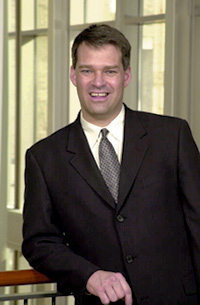“He pushed us to strengthen our own moral compass so that we would be prepared for the ethical dilemmas we will inevitable face in the business world,” says Katherine Magee. “So often, people choose to brush ethical dilemmas under the rug, pretending that you will never face them. Realistically, this is highly improbable, and he taught us to not only expect ethical dilemmas, but to mentally prepare ourselves so that we would have the strength to do the right thing according to our own moral compass.”
FROM PROFESSOR TO ADVOCATE…AND FRIEND
The classroom wasn’t the only place where the Class of 2017 gained life-long lessons from their favorite professors. Over four years, the distances grew smaller, as teachers evolved from role models to mentors. Michael Habib has long stopped thinking of Dr. Elias Semaan as his teacher. Today, he counts him among his friends — a man who “constantly challenges me and pushes me to my fullest potential.” One way Semaan did that was through keeping an eye out for Habib when he helped lead the Madison Investment Fund, James Madison’s student-led investment fund.
“By entrusting me with important responsibilities and mentoring me through them, Dr. Semaan has helped me become more confident in my own abilities and realize what I am capable of accomplishing,” he says.
Such personal attention is the trademark of Severin St. Martin, who heads up the University of Minnesota’s Carlson Consulting Enterprise. His emphasis on learning about students outside of academics is one reason why he is a favorite of Callie Livengood. “This semester, he went out of his way to have one-on-one meetings with nearly all of his students about their career aspirations,” she observes. “This conversation helped me make my job decision. Additionally, he continuously pushed me and other students to think about things differently, which has caused me to grow professionally and personally.”
The University of Missouri’s Dr. Andy Kern is another professor who takes a deep interest in students on a personal level according to Greg Stringfellow. However, Kern takes it a step further by becoming a strong advocate for them. “When I expressed interest in a career in the financial services industry to him,” Stringfellow recalls, “he immediately began to help me with interview preparation and making sure that I had all of the background knowledge that I would need to be successful once I secured the internship. Dr. Kern has been one of the most influential people in my college career and such a great mentor and friend along the way. I wouldn’t be where I am today without his unwavering support.”
In their process of learning from these special teachers, many business majors found their calling. That was true for Wake Forest’s Barrett Redmond. During his “Global Service Engagement” course with Dr. Mary Gerardy, he took a deep dive into issues ranging from AIDs to refugees, an experience that, in his words, “challenged me, angered me, saddened me, but most importantly, motivated me.” A big part of that was the stage set by Dr. Gerardy. “She taught the course with an objective passion that fostered deep class discussion and thought,” he explains. “The discussions I had Dr. Gerardy’s class became the driving motivation behind my entire educational path at Wake Forest, steering me towards a major in Non Profit Management and a minor in Entrepreneurship.”
In the end, students are inevitably a teacher’s legacy. While they may never know their full impact, teachers can hope that their hard-won wisdom and calls to action are echoed from the high rises of Manhattan to the shanties of Cape Town. For Benjamin Fouch, Professor Carl Ackermann personifies the pride and dedication that the University of Notre Dame takes in teaching. Calling him a “force of nature,” Fouch admires Ackermann for setting the bar as a “tremendous force for good” — a servant leader whose purpose compels him to place others before himself and work tirelessly to bring out the best in every student who steps foot in his classroom.
“Professor Ackermann commits to memory the names, faces, and facts of about roughly five hundred students each semester,” Fouch notes. “These students will enjoy his personal friendship for their college careers and beyond, as Carl will meet with hundreds of current and former students each semester. He has committed his life’s work to the development of young people, and he approaches his work with an energy and sense of service that I have never seen in a person. He teaches each of his students many valuable lessons about how to live one’s life that I will carry with me always.”
That’s just the start. This is what the Class of 2017 had to say about some of their other favorite professors.
“My favorite instructor is Susan Clark, a finance professor. She has a passion for teaching, a desire to help students succeed, and has an amicable demeanor that encourages active engagement throughout the course. She has acted as both an educator and a mentor for me, and I was privileged to have her as an instructor.”
– Michael Inman, Ohio State (Fisher)
“My favorite professor is Assistant Dean Mario DiFiore, as he always challenged how I made decisions and the way I evaluated the psychological influences affecting other people’s decisions. His knowledge and passion were contagious and made me recognize the importance of psychology in the business world. He made me realize that being able to effectively utilize these concepts can allow for better bottom-line results for individuals and companies. Hearing about his relevant, personal, real-life experiences made for engaging discussions and a deeper connection and understanding.”
– Samantha Foulston, Fordham University (Gabelli)
“Professor Cindy van Es. Her mastery of the subject and engagement with students was unparalleled among all faculty at Cornell. By communicating with student leaders and administration alike, she was able to positively impact the campus environment and create visible change for all future Cornell students.
– Kenneth Sang, Cornell University (Johnson)
“This is a tough one because I had many great professors over the years. I would have to say Mr. Eddie Davila, Supply Chain Management (SCM). Even though SCM is not my major, Mr. Davila made this subject incredibly interesting. In fact, I believe that he is the sole reason why several students switched majors to Supply Chain Management. But the thing I like most is that he is able to promote originality, creativity, and critical thinking when thinking about business. He teaches that in a business world that is cluttered with the same processes and information, approaching situations in a different way can pay off in the long run.”
– Juan Pablo Forno Parra, Arizona State (Carey)
“Professor Kabrina Chang in LA245 because she applies her intellectual understanding of law to business concepts. This allows for a deeper understanding of the ramifications that business decisions may have on society.”
– Justin Flynn, Boston University (Questrom)















Questions about this article? Email us or leave a comment below.